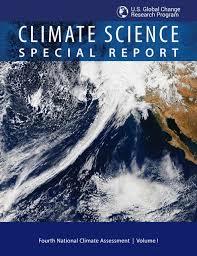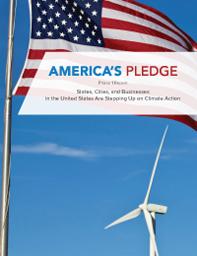- 2017 National Climate Assessment, COP 23, and Stateside Commitments
- New Videos: You’ll Want to See These Microgrid Presentations
- The Urgency of Now: A Timely Event Honoring Cross-Generational Sustainability
- #Giving Tuesday — Support a Resilient Future on Nov. 28!
- Resilient Events Calendar
- Your Membership Counts!
What’s New
2017 National Climate Assessment, COP 23, and Stateside Commitments
The 2017 National Climate Assessment (NCA) Climate Science Special Report (Volume 1) was released on November 3. The National Climate Assessment summarizes the impacts of climate change on the United States, now and in the future.
A team of more than 300 experts guided by a 60-member Federal Advisory Committee produced the report, which was extensively reviewed by the public and experts, including federal agencies and a panel of the National Academy of Sciences. Volume II, Climate Change Impacts, Risks, and Adaptation in the United States (NCA4 Vol. II), will be published in early 2018.
The U.S. Global Change Research Program (USGCRP) was mandated by Congress in the Global Change Research Act (GCRA) of 1990. Its mandate is to develop and coordinate “a comprehensive and integrated United States research program which will assist the Nation and the world to understand, assess, predict, and respond to human-induced and natural processes of global change.”
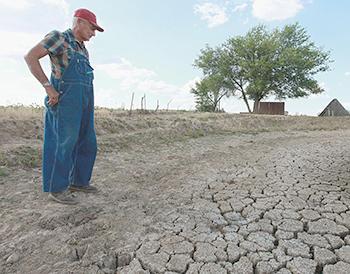 Every four years a new report, developed through extensive input from the latest scientific research, is published and submitted to the President and Congress and to the public. This report assesses the effects of global climate change, both human-induced and natural, on the natural environment, agriculture, energy production and use, land and water resources, transportation, human health and welfare, human social systems, and biological diversity.
Every four years a new report, developed through extensive input from the latest scientific research, is published and submitted to the President and Congress and to the public. This report assesses the effects of global climate change, both human-induced and natural, on the natural environment, agriculture, energy production and use, land and water resources, transportation, human health and welfare, human social systems, and biological diversity.
A summary of the findings include the following:
- The report confirms the well-established science behind climate change: it is real, it is human-caused, it is happening faster than predicted, and it poses a tremendous threat to America and the rest of the world.
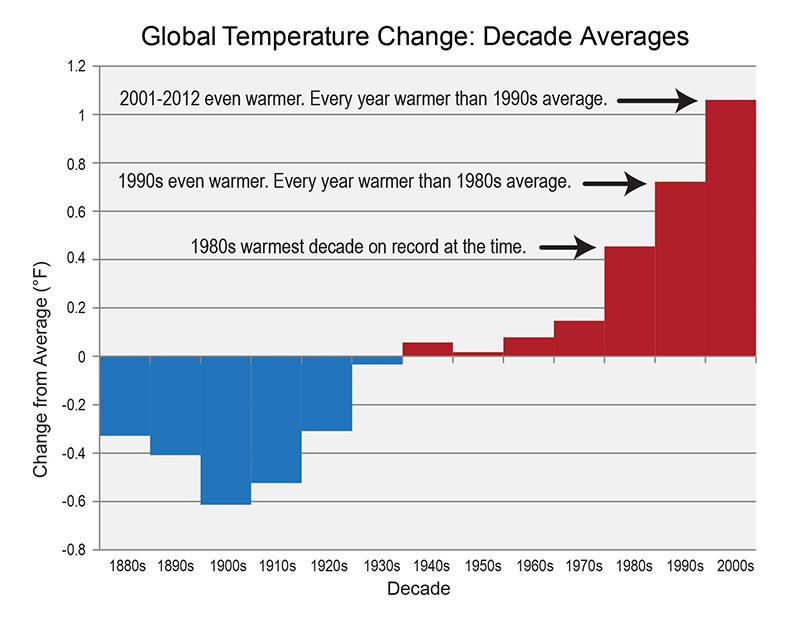 This is now the warmest period in the history of modern civilization. Global annually averaged surface air temperature, and the annually averaged temperature in the U.S., has increased by about 1.8 degrees F (1 degree C) over the last 115 years (1901–2016), with Alaska warming twice as much. Last year was the third year in a row, following 2015 and 2014, to set a new global record for the warmest year. (Click graph for larger image: The last five decades have seen a progressive rise in the Earth’s average surface temperature. Bars show the difference between each decade’s average temperature and the overall average for 1901-2000. (Figure source: NOAA NCDC).)
This is now the warmest period in the history of modern civilization. Global annually averaged surface air temperature, and the annually averaged temperature in the U.S., has increased by about 1.8 degrees F (1 degree C) over the last 115 years (1901–2016), with Alaska warming twice as much. Last year was the third year in a row, following 2015 and 2014, to set a new global record for the warmest year. (Click graph for larger image: The last five decades have seen a progressive rise in the Earth’s average surface temperature. Bars show the difference between each decade’s average temperature and the overall average for 1901-2000. (Figure source: NOAA NCDC).)- Based on extensive evidence, there is no convincing alternative explanation that anything other than human activity is the dominant cause of the observed warming since the mid-20th Century. The global warming of the past 50 years is primarily due to human activities, predominantly the burning of fossil fuels.
- Global atmospheric carbon dioxide concentrations have now passed 400 parts per million (ppm), a level that last occurred about 3 million years ago, when both global average temperature and sea level were significantly higher than today. Continued growth in these emissions over this century and beyond would lead to an atmospheric concentration not experienced in tens to hundreds of millions of years.
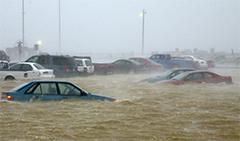 Human-caused climate change has made a substantial contribution to the observed 7–8 inches of global average sea level rise since 1900, the greatest rate of rise in at least 2,800 years. Global average sea level is expected to continue to rise by at least several inches in the next 15 years, and by 1–4 feet by 2100. A rise of as much as 8 feet by 2100 cannot be ruled out.
Human-caused climate change has made a substantial contribution to the observed 7–8 inches of global average sea level rise since 1900, the greatest rate of rise in at least 2,800 years. Global average sea level is expected to continue to rise by at least several inches in the next 15 years, and by 1–4 feet by 2100. A rise of as much as 8 feet by 2100 cannot be ruled out.- The report also focuses on regions within the US and for the Southeast region, and details the following threats: 1) Sea level rise poses widespread and continuing threats to the region’s economy and environment. 2) Extreme heat will affect health, energy, agriculture, and more. 3) Decreased water availability will have economic and environmental impact.
(Source: World Resources Institute, 11/7/2017)
United Nations COP23 Meeting
The United Nations Climate Change Conference, the 23rd annual “Conference of Parties” (or COP23) took place in Bonn, Germany, November 6–17, 2017. A brief summary at the closing of the meetings indicates that:
1. The 195 countries signing the Paris Agreement remain committed to a collective framework on international climate action. Nicaragua and Syria, the only two countries that had not signed the original Paris Agreement in 2015, indicated their support, while the U.S. government indicated it might consider re-commitment at a later date.
2. The international community has yet to send a strong signal that it is committed to transitioning away from fossil fuels. However, an alliance of 19 countries, headed by the United Kingdom (UK) and Canada, committed to phase-out coal production. In the UK, electricity produced by coal has fallen from 40 percent to 2 percent since 2012.
3. Little progress was made defining specific emissions-cutting guidelines. Activists call for a “robust set of rules,” but that rulebook remains woefully thin. A U.S. government presentation about the necessity of fossil fuels sparked one of the conference’s biggest protests.
(Source: Environmental Health News, November 18, 2017)
On November 11, 2017, the COP 23 Special Advisor for States and Regions California Governor Edmund G. Brown Jr. and Michael R. Bloomberg, the United Nations Secretary-General’s Special Envoy for Cities and Climate Change, released the America’s Pledge report at the U.S. Climate Action Pavilion, a purpose-built exhibition space sponsored by U.S. non-federal leaders at the COP23 meeting.
The report is the first communication to the international community specifically addressing the scope and scale of non-federal climate action in the United States following the Trump administration’s decision to withdraw from the Paris Agreement. It captures and quantifies the outpouring of public support for the agreement since the withdrawal announcement, finding that cities, states, and businesses representing more than half the U.S. economy and population have declared their support for the Paris Agreement, including more than 2,300 signatories to the “We Are Still In” declaration.
 A total of 20 U.S. states, 110 U.S. cities, and over 1,400 businesses with U.S. operations representing USD $25 trillion in market capitalization and nearly 1.0 gigatons of GHG emissions per year have adopted quantified emissions reduction targets.
A total of 20 U.S. states, 110 U.S. cities, and over 1,400 businesses with U.S. operations representing USD $25 trillion in market capitalization and nearly 1.0 gigatons of GHG emissions per year have adopted quantified emissions reduction targets.
“The group of American cities, states, and businesses who remain committed to the Paris Agreement represents a bigger economy than any nation outside the U.S. and China,” said Bloomberg. “Together they are helping deliver on the promise of the agreement and ensuring the U.S. remains a global leader in the fight against climate change.” (Source: Press Release, America’s Pledge, 11/11/2017)
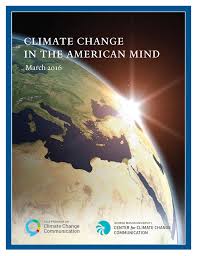 And finally, the latest survey from George Mason University’s Center for Climate Communication reveals that the number of Americans “very worried” about global warming has reached a record high since first measured in 2008. A majority of Americans (63%) say they are “very” or “somewhat” worried about the issue. Likewise, Americans increasingly view global warming as a threat. Since Spring 2015, more Americans think it will harm them personally, their own family, people in the U.S., people in developing countries, and future generations. You can read the full survey report here.
And finally, the latest survey from George Mason University’s Center for Climate Communication reveals that the number of Americans “very worried” about global warming has reached a record high since first measured in 2008. A majority of Americans (63%) say they are “very” or “somewhat” worried about the issue. Likewise, Americans increasingly view global warming as a threat. Since Spring 2015, more Americans think it will harm them personally, their own family, people in the U.S., people in developing countries, and future generations. You can read the full survey report here.
Note: Find out more about the NCA report and COP23 at the November 30 Webinar: The Fourth National Climate Assessment and Outcomes from the UN Climate Change Conference in Bonn — COP 23. 1:15–2:45 pm EST. Register at securityandsustainabilityforum.org.
New Videos: You’ll Want to See These Microgrid Presentations
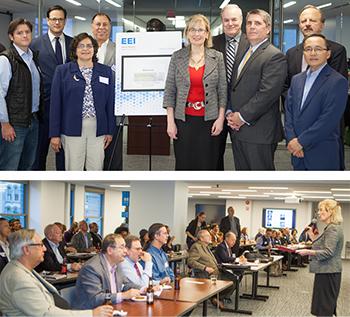 Resilient Virginia teamed with Leaders In Energy on October 19, 2017, to bring together an exceptional group of national and regional speakers on microgrids, with emphasis on this distributed energy technology as a means to significantly increase energy resiliency.
Resilient Virginia teamed with Leaders In Energy on October 19, 2017, to bring together an exceptional group of national and regional speakers on microgrids, with emphasis on this distributed energy technology as a means to significantly increase energy resiliency.
This evening event, attended by over 100 people, featured speakers from the US Department of Energy, the military, Edison Electric Institute, USGBC’s PEER certification program, and regional microgrid projects.
We are pleased to be able to share with readers the following video presentations in order of appearance:
National Perspective
John Caldwell, Director of Economics, Edison Electric Institute
J.E. Surash, P.E., Acting Deputy Assistant Secretary of the Army for Energy and Sustainability
Robert Hughes, Executive Director of the Office of Energy Assurance, U.S. Air Force
Dan Ton, Program Manager for Smart Grid R&D, U.S. Department of Energy
Regional Market Development
Michael Yambrach, Capital Projects Manager, Montgomery County
Bracken Hendricks, CEO and Founder, Urban Ingenuity, LLC
Brendan Owens, Chief of Engineering, PEER, U.S. Green Building Council
You can also read an in-depth review of the presentations provided by Leaders in Energy.
Above:Janine Finnell, Executive Director of Leaders in Energy, opens an event on microgrids opens an event on microgrids in this video from October 19, 2017. Other presentations from this event are available here.
 The Urgency of Now: A Timely Event Honoring Cross-Generational Sustainability
The Urgency of Now: A Timely Event Honoring Cross-Generational Sustainability
Resilient Virginia is helping to promote a timely event — Leaders in Energy’s 4th Annual “Four Generations of Leaders in Clean Energy & Sustainable Solutions Awards and Holiday Event” on December 1, 2017, 6:00–9:00 pm. The event will recognize people across four generations who are raising awareness and developing clean energy and sustainable solutions, with a visible sense of urgency.
This year there will also be a Lifetime Achievement Award given to S. David Freeman, eco-pioneer and author. Freeman has provided progressive leadership to major public utilities coast to coast. Under President Jimmy Carter, he shaped an efficiency-based energy policy as head of the Tennessee Valley Authority. His most recent books include “All Electric America: A Climate Solution and the Hopeful Future.”
 On November 28 you can be part of a national movement to celebrate giving to worthwhile causes.
On November 28 you can be part of a national movement to celebrate giving to worthwhile causes.
Support our work to make your community more resilient!
Resiliency has many meanings:
- being prepared for a storm that might damage your house,
- bringing new businesses to your community,
- making sure your family has access to healthy food,
- preparing for flooding from hurricanes and high tides,
- keeping the lights and heat on in your home or business,
- having safe drinking water free from harmful substances,
- protecting your trees and other natural resources,
- buying fresh produce from local farmers,
- supporting cleaner energy sources for your home and car.
Resilient Virginia supports community resiliency by giving you the resources to move ahead with being more prepared for the future. Support our organization on #Giving Tuesday and help us continue to Inform, Educate, and Activate!
Thanks to Our 2017 Annual Sponsors
Platinum Sponsor
 Community Leader Sponsor
Community Leader Sponsor
Resilience Events Calendar
Fall 2017 Event Highlights
- November 30: Webinar—The Fourth National Climate Assessment and Outcomes from the UN Climate Change Conference in Bonn – COP 23.1:15–2:45 pm. Register at securityandsustainabilityforum.org.
- December 1: 4th Annual Leaders in Energy Four Generations Awards and Holiday Event. Register at lercpa.org/4th-annual-4gen-awards/.
- December 6–7: Farm to Table Conference: Cultivating Resilient Food Systems and Communities for the Common Wealth and Common Good.To register: http://conference.virginiafarmtotable.org/register/.
Check our Resilient Events Calendar on a regular basis to find out what is happening in Virginia, around the nation, and virtually through webinars.
Membership — Always in Season!
Resilient Virginia is on a mission to
*Inform *Educate and *Activate
Virginia communities to build resiliency in the face of challenges to community prosperity, national security, and changing climate.
You can help by:
Becoming a Member
Signing on as an Annual Sponsor




